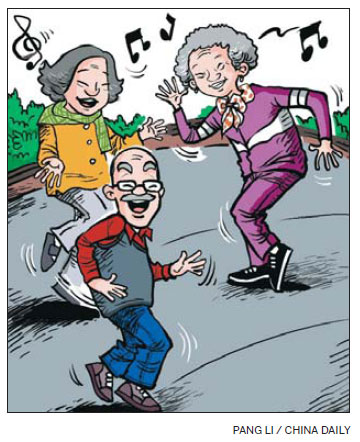


In a hutong in Gulou, a large crowd of people is congregating, and they have organized themselves into lines. All of a sudden music starts - faintly at first but then it gets louder. The people begin waving their arms in unison; they sway slowly from side to side. It is a dark night and the street is poorly lit, but as I move closer I realize that they are dancing.
"How strange. Nobody dances in the street in England," I tell my companion, a fellow Brit who has been in China a lot longer than I have.
"Oh, that happens a lot here. Locals dance in the street for exercise," I am told.
"Completely free of charge?" I ask - bemused by this alien activity.
"Yes, anyone can join in," my friend informs me.
This was my first experience of outdoor exercise in Beijing. The sight fascinated me. In London, it seems the high crime rates keep people from lingering on street corners at night.
The incident intrigued me so much that I spoke to a colleague at work about it the next day. He told me that, in the hutong, people tended to take part in folk or disco dances because volunteers within the community run free lessons. They even bring loudspeakers and CD or cassette players to the site to encourage others to get involved. My friend told me that there were three dancing groups in his neighborhood and that one was a disco dancing group, catering to more than 100 people.
I had forgotten about outdoor exercise until I was confronted with it again. My second experience came early on a Monday morning. Half asleep and in need of my morning coffee fix, I stumbled across the courtyard at China Daily to see a group of women outside stretching together. Once again, bemused, I asked someone what the women were doing and was told that taking stretching exercises before and after work was quite common.
This reminded me of something a journalist said in my last job, as an intern at The Telegraph in London. The woman sitting opposite me always joked that we should start a stretching session in our lobby because sitting hunched over a computer was an awful way to spend the day. It was just a flippant comment; most people in Britain would rather spend their lunch breaks working out alone in the gym next to a humming treadmill than running or dancing with others.
Group exercise classes in the UK cost an arm and a leg. Before I came out to China, I signed up for a "boot camp", priced at 15 pounds ($24) a session, which took place on my local common. It involved a male instructor barking orders at me and other participants for about an hour to an hour and a half, telling us to "run faster" and "keep our legs up". I failed on both accounts.
It is nice that in Beijing local communities put on exercise classes for free. These group events also seem like a lot of fun and are taken far less seriously than they would be back home. I'm told that people of all ages move to music in Beijing; but the older generation opts for folk dance over disco. This sense of community spirit is touching and missing from our big cities, especially London.
This week, I have arranged to do some tai chi with another colleague at work. She is going to take me and some friends to Chaoyang Park at 7:30 am to experience this traditional martial art.
I have heard that tai chi is good for physical and mental well-being, and look forward to trying it, despite the early start. It's more proof that communal outdoor exercise in China is a sociable thing and manages to bring people from all walks of life together.
As for future exercise opportunities perhaps it is time to put on my dancing shoes.
Contact the writer at sarah.marsh0@gmail.com.
China Daily

(China Daily 10/23/2012 page18)